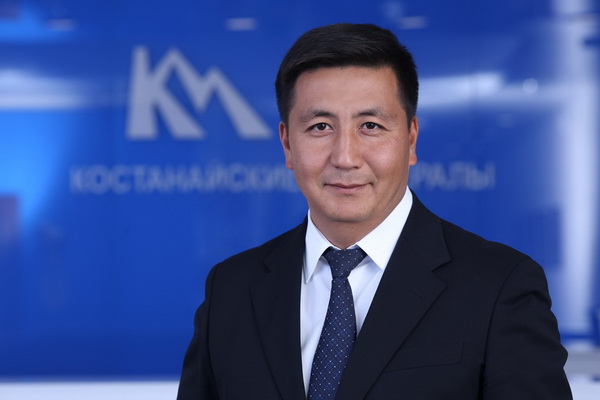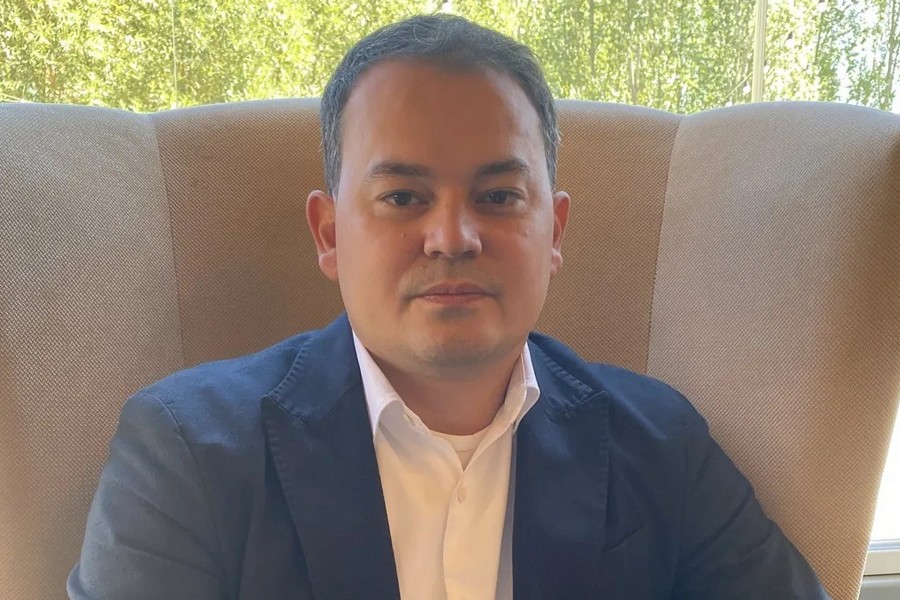Chairman of the Management Board of JSC Kostanai Minerals Erbol NURKHOZHAYEV:
THE MARKET IS STABLE AND THE SITUATION SHOULD REMAIN AS IT IS IN THE SHORT TERM

The only enterprise in Kazakhstan specializing in the extraction and processing of a rare mineral – chrysotile - has recovered from the aftermath of the 2015-2016 crisis. Then the company was faced with a sharp reduction in the consumption of chrysotile and, as a consequence, in its shipment volumes. In the first half of the year, the company's chrysotile production increased by 20%. Chairman of the Management Board of JSC Kostanai Minerals Erbol NURKHOZHAYEV told Interfax-Kazakhstan on how the company managed to stabilize the market, get away from negative trends and achieve increasing volumes.
- How did Kostanai Minerals perform in the first half of the year? Was it possible to implement the plans and objectives that had been set?
- The market is stable and in the short term the situation should remain as it is. This year the positive trend in increasing consumption of chrysotile and, as a consequence, the volume of its shipments, has been ongoing. Thus, the output of Group 3-6 chrysotile amounted to 98,597 tonnes in the first half of 2017, to 81,371 tonnes in the first half of 2016 and to 170,000 tonnes in 2016, the expected volume for 2017 is 190,000 tonnes.
Changes in the world’s economic and political picture are the main cause for these phenomena, which indirectly reflects the situation in the consumption market and shows a positive trend in a number of countries consuming chrysotile.
As for the plans and objectives set for the first half of the year, one can note that we continue to increase steadily in-house effectiveness of all business processes, work on equipment and personnel productivity, efficiency, and improve technological performance.
- Were the year of 2016 and the first half of 2017 not unprofitable for you?
- The company has started confidently the second half of the year gaining a good pace. In a nutshell, now the positive results for 2016 and the first half of 2017 confirm the correctness of the development strategy chosen by the company. We are convinced that further the company will be able to show stable and balanced results.
- Does it mean that the negative trend in decreasing chrysotile consumption has ended? And the survival period, as well?
- We have been working under crisis conditions for a long time. We have been trying to face up to prohibition for 10-15 years. We have been fighting off, defending ourselves. Despite that the company managed to achieve positive economic results last year and in the first half of 2017. The earned profit allowed us to repay borrowed funds to banks, approve the extensive investment program for 2017, tackle the issues of increasing significantly the level of labor remuneration in the company. With regard to 3-6 group chrysotile shipments the expected 2017 shipment volume is 180,000 tonnes, [shipment volume] in 2016 was slightly less - 170,000 tonnes.
- Please tell [us] about the new projects you are implementing.
- Currently there is a question of the effective use of stock. We recently completed the program of transition to a one-cascade recovery scheme: main technological equipment was replaced. As a result, the technological chain was reduced by 40%. In the past four years the energy consumption of the enterprise has decreased by 30%, and accordingly the equipment cost and equipment maintenance cost too. At the same time we have increased productivity.
Asphalt stabilizing additive EcoTop has become one of the latest novelties in the road construction domestic production. The project value is 22.304 million tenge (340.35 tenge/$1). The Stabilizing Additive EcoTop project envisages the use of chrysotile fibers for road construction. This experience has come from Canada - crushed stone and mastic asphalt. Our fibers can be used as stabilizing additives. They do not burn and work perfectly with both bitumen and concrete. Currently Kazakhstan imports wood additives and many other stabilizing additives. They are quite expensive. Our domestic product is several times cheaper and better. Our mineral fiber has properties that are in demand in road construction.
The next unique project is upgrade to the electric locomotive fleet using electricity recuperation. Now Kostanai Minerals has made a big breakthrough. The quarry traction unit has been upgraded so that it can transmit generated electricity to the grid. Due to that it has become not only more economical, but also more productive. It took two years to implement the idea.
Another important project is being implemented in the railway transport shop of JSC Kostanai Minerals. Mercury arc lamps used earlier for lighting are being replaced by LED ones. They consume much less electricity. We will carry out this work within 5 years across the entire company. A special plan has been developed. LED lamps will consume 8 times less electricity than their mercury predecessors. And in addition, keep in mind the fact that their service life is up to 20 years.
We are implementing several more projects aimed at energy saving, namely, from the field of green energy. To date, the company has installed the most powerful solar battery in the region. This is a pilot project we launched at the beginning of the year. We decided not to use someone else’s experience, but gain our own experience. Over its operation period the battery has generated such an amount of electricity, which is fully sufficient for this shop. For example, now it is running exclusively on solar power. We are also implementing many other optimization and investment projects - upgrading some mining equipment, repairing and purchasing engines for heavy-duty dump trucks, upgrading presses for briquetting products, installing a vacuum dust collection system in a recovery shop, a crushing and sorting line for crushed stone production.
- How are the competitors getting on? What is the situation like at the moment? Is your company still experiencing hard times or is it easier to work?
- We are working in the highly competitive environment with manufacturers from Russia, Brazil, China and a number of the other countries, and this competition is on the rise. But we have an interesting environment: everyone is concerned with anti-asbestos rhetoric. We have to cooperate and unite in associations. This is a special inner circle. At the same time, competition is competition. Our proved reserves at the current rates of extraction and production will be enough for another 100 years. This is one of our main advantages over competitors.
Since 2014 the company top management has been actively working towards production diversification as an alternative to production of the main item. The main areas chosen are individual construction housing with the expansion of a range of building materials and road construction.
The use of chrysotile-containing materials also makes it possible to develop technologies for low cost construction of low-rise durable and energy-efficient buildings. Studies conducted by the CIS Chrysotile Association have shown that even a small increase in the share - up to 10% of the total volume – of chrysotile- containing materials in the housing construction and utilities sector will lead to multi-billion budget funds savings annually. Our product is unique that’s why we decided to diversify, develop the production lines for processing side products. But this aspect should be profitable - at least 10-15%. There is no talk of any financial support at the expense of core business. This should be business to help the enterprise tomorrow.
- How are the exports? Where are you currently shipping the products? Were the export relations with Ukraine reset? Did you find new partners?
- Kostanai Minerals is an export-oriented company. In recent years growth in the share of shipments to far-abroad foreign countries has been the tangible tendency. The main product exports fall on the non-CIS countries: India, China, Sri Lanka, Vietnam and Thailand. Shipments to Ukraine compared to last year have increased by 65.6%, the dynamics are same regarding shipments to the domestic market, so compared with last year consumption has increased by 26.6%.
- The question of harmfulness of chrysotile. Is there any novelty on this matter?
- Chrysotile asbestos stood the test of the Rotterdam Convention in 2017. We continue to fight for the right to extract, use and export chrysotile asbestos. At the Geneva conference of the Parties to the Rotterdam Convention held in 2017 a number of countries, including Russia, Kazakhstan and Kyrgyzstan, opposed the proposal to recognize this substance as especially dangerous. Defenders of chrysotile fiber managed to prove that there is no reason for considering our products harmful to human health provided that minimum industrial safety requirements for aspiration and workplace maintenance are met. The ban on the use of chrysotile fiber was not adopted and this provides a strategic prospect for the chrysotile industry in Kazakhstan and in the world.
Kazakhstan supports the provisions of the 1986 International Labor Organization Convention No. 162 of the International Labor Organization on labor protection during the use of asbestos and believes that compliance with the requirements of this Convention while implementing a set of measures to control the use of chrysotile asbestos and products based on it guarantees the safety use for people and the environment.
- What are your plans for 2018?
- First of all, to expand the sales markets, and, as a result, increase the production volume. In any case, our course will remain unchanged: to increase the in-house process efficiency both through the introduction of modern technologies and equipment, and through the large-scale introduction of lean manufacturing tools in all of technological cycles. In terms of production diversification the construction of individual housing and production of materials for road and housing construction remain the main aspects.
- Thank you for the interview!
September, 2017
© 2025 Interfax-Kazakhstan news agency
Copying and use of these materials without reference to the source is prohibited
Archive





